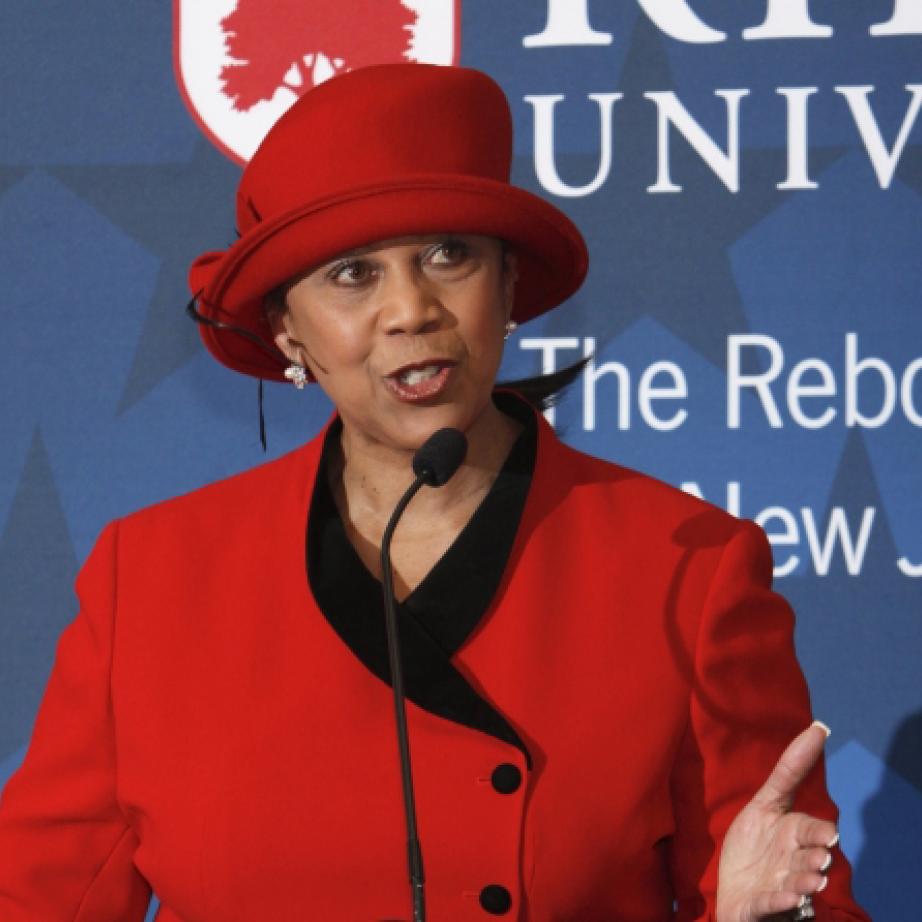Wednesday, Feb 29, 2012
In a February 27 address sponsored by the Rebovich Institute for New Jersey Politics, Assembly Speaker Sheila Oliver recalled her political origins, discussed the state’s most pressing issues, and said that the partisan divide is greatly overstated among the state’s voters.
by Sean Ramsden
Growing up in the South Ward of Newark during the early 1960s, Sheila Oliver identified with the lives she saw portrayed on television – Donna Reed, Beaver Cleaver, and even Marlo Thomas in That Girl. However, she also recalls sitting in her family’s sunroom, closely watching the dramatic Bay of Pigs Invasion unfold on the RCA set her mother had recently purchased.
“I was 11 years old, watching the news every day,” recalled Oliver, now the speaker of the New Jersey General Assembly and the first African-American woman to lead a legislative house in the Garden State. “I became obsessed with whether or not we’d have a war, and I began to pay a lot of attention to politics.”
Oliver recalled her introduction to advocacy and government at a presentation sponsored by the Rebovich Institute for New Jersey Politics of Rider University on the institution’s Lawrenceville campus on February 27. A Democrat, Oliver was elected to the Assembly in 2004, and represents the state’s 34th Legislative District, which includes the Essex County municipalities of Orange, East Orange and Montclair, as well as Clifton in Passaic County. She became speaker in January 2010, following the retirement of her fellow Democrat, Joseph J. Roberts.
As a student at Newark’s Weequahic High, during a time of what she called “social revolution,” Oliver became involved in a number of civic activities that served to deepen her interest. “I became hooked,” she recalled. “It was affirmed within me that people can make social and civic change.”
Today, Oliver seeks to effect change on the statewide level, where her conflicts with Republican Gov. Chris Christie have been the subject of numerous headlines. “I don’t have to tell anyone in this room that we have a governor who is not like anyone we have seen,” she said, but added that for all the rancor generated across the aisle, the partisan divide is dramatically overstated – at least among the state’s voters.
“New Jersey has more registered independents than it does Republicans or Democrats, and the people in this state make their own political decisions on the issues that emerge,” Oliver said, though she conceded that there are many within both parties who steadfastly refuse to embrace another’s ideology – for better or worse.
“There are issues that some members hold very near and dear, but if we cling too tightly to those partisan issues, we will never get anything done for the people of New Jersey,” Oliver explained. “People in a group environment should always seek a ‘win-win’ situation … try to reach a place that can be acceptable to everyone.”
Oliver said that some of the more significant pieces of legislation to emerge from her first term as speaker include the two-percent property tax cap and the benefits reform package for state employees. And while she admitted that the debate over both items was rather contentious, “the reality is that our state is in the midst of an economic recession,” she said.
“There simply are not enough hours here to discuss all the issues that are confronting our municipalities,” Oliver explained. “The biggest cost drivers they face are public safety and personnel costs.”
The poor performance of the New Jersey’s more urban public school districts also plays a huge part in the state’s political discourse, according to Oliver. It is a problem she believes originates from the growth of the suburbs in the 1950s, when people began to migrate away from centralized cities and develop housing in concentric circles around those urban centers.
“By the late ’60s and early ’70s, there was a broad ‘suburban-versus-urban’ divide, and in the time since, there has been a decimation of the economic structure in most cities in this state,” Oliver said, explaining that the divide is now manifested in the “animosity” among suburban dwellers over their high property taxes, and the fact that little of that money ever returns to their towns. While she understands their concern, Oliver also says that New Jersey’s vital urban centers are simply too important to underfund. “The state cannot thrive economically unless our cities are doing well,” she said.
Still, Oliver continued, property taxes are the number one issue confronting families in the state, and that “the legislature, in cooperation with the governor, has to move more progressively to address them.” One proposal she believes will not achieve success toward that end is Gov. Christie’s proposed 10 percent income tax cut across the board.
“We feel that the 10 percent cut over three years is not the relief these families are looking for,” she said.
The Rebovich Institute for New Jersey Politics at Rider University is dedicated to public service and scholarly analysis of government, public policy, campaigns and elections in New Jersey. Generous support for The Rebovich Institute for New Jersey Politics comes from the Hennessy Fund. Upcoming speaker events this spring include former Gov. James J. Florio on March 22; top Republican strategist Karl Rove on April 2; and Sen. Frank Lautenberg on April 11. All events are on Rider’s Lawrenceville campus. Former Gov. Christine Todd Whitman will speak on October 3. For more information on the Rebovich Institute, visit www.rider.edu/Rebovich.

